Nicolás Chica, manager of Agroláchar, about the asparagus campaign:
“What’s the use of the price being high, when the kilos harvested are so few?”
Asparagus producers in Granada, Spain, are understandably concerned, following a campaign heavily impacted by drought and insufficient rainfall. November was extremely dry, with only 2% of the average rainfall for this month, according to Aemet data.
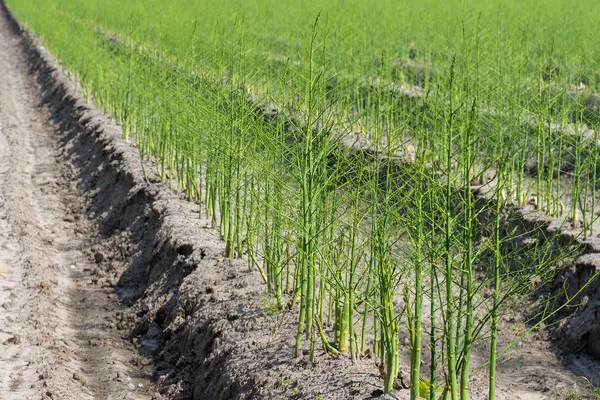
“If everything continues like, the next campaign will be bad. This follows a year in which yields have been 45-50% lower, and we are at a point where water resources are very limited, making it difficult for the claws to accumulate the necessary reserves for the crop to thrive when spring arrives,” says Nicolás Chica, manager of the Granada-based cooperative Agroláchar and general secretary of UPA Granada.

“This is all generating a lot of uncertainty in the province’s asparagus sector, and causing some concern about the possibility of the claws themselves being affected by the lack of water, and not just the production, especially in dryland plantations, which in Granada account for a significant area, with more than 6,000 hectares in production. In this case, we would not be talking about a decrease in the next campaign, but about possible structural damage to the plantations affected.”
“It is still too early to make any forecasts, so all we can do for now is hope it will rain in January. In that case, we may see an improvement of our current prospects,” he says.
“The good thing is that 2023 has been a good year in terms of prices”
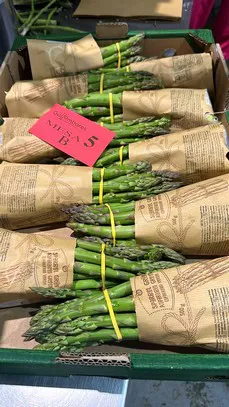 Granada’s asparagus campaign will start in March, and the harvests in other European production regions will follow later. A number of tests have already been carried out by the sector with the goal of advancing the start of the campaign, says Nicolás, “using meshes, microtunnels and other greenhouse structures. We are talking about a campaign that lasts three months, so being able to start a month earlier would be very positive. However, the expected results haven’t been achieved so far. We have not been able to advance the start as much as we hoped, and the costs have been quite high. Moreover, the structures made the harvest more difficult, and asparagus are harvested daily.”
Granada’s asparagus campaign will start in March, and the harvests in other European production regions will follow later. A number of tests have already been carried out by the sector with the goal of advancing the start of the campaign, says Nicolás, “using meshes, microtunnels and other greenhouse structures. We are talking about a campaign that lasts three months, so being able to start a month earlier would be very positive. However, the expected results haven’t been achieved so far. We have not been able to advance the start as much as we hoped, and the costs have been quite high. Moreover, the structures made the harvest more difficult, and asparagus are harvested daily.”
“There is also the threat of frosts. When temperatures fall below 0 degrees Celsius, they can cause great damage to the crop, since asparagus are mainly made up of water. It is true that after a frost destroys an asparagus production, the turions reappear after a week, but I repeat, in a three-month campaign, a lost week can mean the loss of 8% of the production. Therefore, in the end, it is best not to force the crop and wait for it to grow following its natural cycle.”
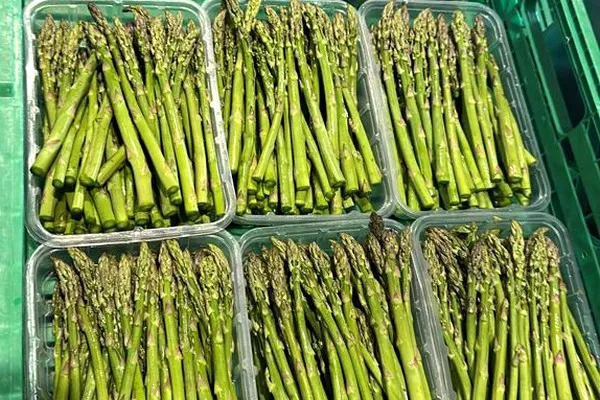
The entire sector is looking cautiously ahead, hoping for the best results this campaign, while not forgetting the campaign that has just concluded with the last harvests of September and October. “The positive thing is that 2023 has been a good year in terms of prices. Our cooperative’s producers have marketed their crops for an average of more than 3 Euro per kilo, and on some occasions, we have even reached 3.50 Euro per kilo. In the end, however, the amount of kilos has been so small that the high price hasn’t made much of a difference. What is the use of the price being high, when the kilos harvested are so few?”
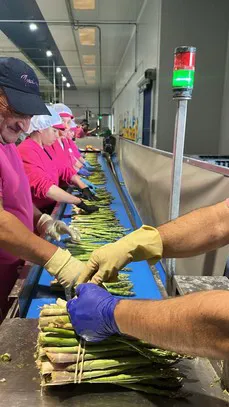 “What matters is the money that goes into the growers’ pockets, and this year it has been infinitely less. However, the market’s valuation of Granada’s green asparagus is increasing exponentially and continues to rise. The externalization work carried out by the operators is bearing fruit and is reflected in a stable demand from large retail chains, with good use being made of international fairs. Thus, green asparagus remains a social and profitable crop for our producers, and the activity’s viability is only affected by adverse weather conditions.”
“What matters is the money that goes into the growers’ pockets, and this year it has been infinitely less. However, the market’s valuation of Granada’s green asparagus is increasing exponentially and continues to rise. The externalization work carried out by the operators is bearing fruit and is reflected in a stable demand from large retail chains, with good use being made of international fairs. Thus, green asparagus remains a social and profitable crop for our producers, and the activity’s viability is only affected by adverse weather conditions.”
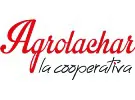 For more information:
For more information:
Agroláchar S.C.A.
Dirección Av. Andalucía, s/n
18327, Láchar, Granada. Spain
Tel.: +34 692 043 375
comercial@agrolachar.com
https://agrolachar.com
Publication date:
